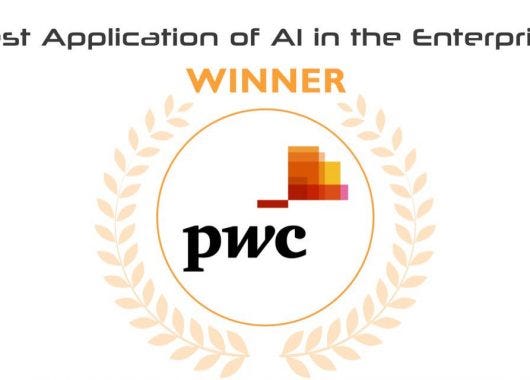Effective Data Strategy and Architecture Are The Key Ingredients for AI Success, say PwC Award Winners
November 15, 2017

In the next two years, autonomous vehicles are set to completely revolutionise the way people live. As The MIT Tech Review noted last week, self-driving vehicles won't just change how we get from point A to B - they'll change the way roads are built, the way cities are planned, and the way we source and distribute energy.
As car companies merge with start-ups, disruptors, and tech giants, autonomous vehicles are likewise unleashing major new vertical partnerships across industry lines. Professional services and consultancy firm PwC are perhaps not the first group that immediately spring to mind when it comes to AI and radical new technologies, but behind the scenes, PwC is producing some of the most innovative enterprise applications of AI. After a successful two days of panels and keynotes at the AI Summit San Francisco, the firm went on to pick up the AIconics award for 'Best Application of AI in the Enterprise' for its Agent-Based Modeling with Reinforcement Learning for Autonomous Fleet Coordination solution.
[caption id="attachment_9412" align="aligncenter" width="530"] PwC's Anand Rao accepting the AIconics award for 'Best Application of AI in the Enterprise'[/caption]
PwC's Anand Rao accepting the AIconics award for 'Best Application of AI in the Enterprise'[/caption]
The "Best Enterprise Application of AI" category recognizes the most compelling example of an AI-driven solution deployed commercially, across all industries. More than 300 submissions were made across ten award categories, and winners were selected by an independent panel of judges. Other finalists in the enterprise category included AI-focused companies, including Digital Genius, Luminoso, Daisy and UiPath.
The award-winning solution was developed in collaboration between PwC and a Fortune 100 automaker, which required PwC to explore the operational requirements associated with launching a successful ridesharing network. Anand Rao, Global AI Lead, who led this project, commented, "We see a number of Enterprise AI applications that exploit machine learning or natural language processing to help us make operational decisions. But we used simulation and reinforcement learning is a novel way to address strategic questions or what can be called the 'gamification of strategy'".
PwC Directors Mark Paich and Joseph Voyles were in the trenches working directly on the project with their team. Joseph is a Director in PwC's analytics practice and co-leads the U.S. AI Innovation Lab. He has a wide range of experience across different machine learning technologies, having worked in robotic process automation, natural language processing, simulation techniques, and more. Mark, meanwhile, specializes in dynamic modeling system and agent-based dynamics. The winner of multiple industry-leading awards, he has over 30 years experience as an expert in his field.
"The project 'teaches' the autonomous fleet how to make decisions that take into account future outcomes, including electric charging state, charing locations, city maps, customer pick-up locations, and customer wait times. The individual vehicles are able to perform actions collaboratively as a fleet, maximizing the system's total reward."
Paich highlights two key reasons for the success of the project. It benefited from the fact that their client was very experienced, with a sophisticated grasp on the use of modelling and simulation. This, he explains, enabled them to be "deeply involved in the development of the models and the analysis."
"AI is a tool that is appropriate for some problems, but not in all cases," he argues. In this instance, the project's combination of simulation and reinforcement learning was the right combination of methods for the job.
The Strategic Implications of AI Tech For Enterprises
AI technologies have a range of strategic implications for enterprises, and as the PwC project demonstrates, the kinds of technologies and methodologies being deployed must be carefully grounded in business use cases. "Asking how to apply AI is probably the wrong question," argues Paich. "Rather, businesses have various needs and problems and the question should be, 'what is the best set of tools to approach their issues?' I'm a big believer in using the simplest methods possible. In some cases, that might be traditional statistical models; in other cases, when lots of data is available and forecasting is most important, machine learning might be best."
Companies that fail to approach AI in this pragmatic way are, Voyles argues, at risk of a competitor emerging that disrupts simply by using AI solutions to deliver the same product or service at a lower cost and higher quality. "AI can help companies improve on their existing value chain by lowering operating costs and improving quality," Voyles explains. "However, this will become a necessity moving forward, and will not offer a significant strategic advantage as competitors adopt the same solutions. In order to position themselves to deliver these benefits, companies should plan with a consumer lens - they should prioritize initiatives that lead to capabilities and data assets that can be used to lower the cost in order to serve and provide value to the consumer."
It's well known that AI technologies can improve operations and reduce costs, but as Paich points out, it's vital that businesses model front-facing issues and arrive at a clear application for the technology."My focus is on using AI and simulation to better understand new business opportunities where, by definition, historical data doesn't exist," Paich explains. "In the autonomous vehicle case, we used the simulation to generate simulated data and applied AI to understand the model dynamics - and we learned a great deal in the process."
They agree that companies can only gain a strategic advantage from AI if they are able to use it to guide decisionmaking within their organization. Voyles believes that using AI to simulate markets or competitive dynamics in the way Paich describes can lead to better decisionmaking. "This is especially true for decisions where companies are exploring a completely new or unknown domain like market entry for a new business model or project."
As well as improving decisionmaking, companies can build a strategic advantage with AI by developing products that are differentiated by pairing AI solutions with existing data assets that are unique to their core business and market. "Ultimately, an effective solution will result in products or offerings that are constantly adapting to consumer adoption and usage patterns," Voyles says.
Paich offers a very useful structural concept for deploying AI in business, something the tech community has labelled the 'data flywheel'. "The 'flywheel' is a positive feedback loop - or virtuous circle - in which customers and product usage generate data that, when analyzed with AI or other techniques, can increase customer value. Greater customer value increased the number of customers and usage. This flywheel is an example of what economists call a network effect. In the right conditions, this feedback loop can generate explosive growth and market dominance." AI will be most important, he argues, in markets where it can be used to strengthen the flywheel.
Data Strategy and Architecture: The Most Important Ingredients for Delivering AI Solutions
"Beyond talent, data is probably the most important ingredient for delivering an AI solution. Data is needed in large volumes, high quality, and it needs to be aligned to the objective," says Voyles. "If data is not aligned with consumer priorities in mind, organizations will begin at a disadvantage and find it difficult to deliver consumer-centric solutions. The most mature companies - or those that have seen effective AI applications - are those that have grown up with data playing a central role in the way that products and services have been delivered. Companies that are able to capitalize on their data, adapt their business, and stave off competition from smaller organizations will be those that can effectively apply AI."
A strong AI strategy is therefore ultimately underpinned by an effective analytics approach. Voyles believes that this combines technical prowess with what he calls 'deep domain expertise'. "We have seen a lot of projects fail to deliver because a solution, while technically sound, does not provide practical insights and effectively address the business question," he says. "On the flipside, we have seen analyses that start with clearly defined vision, but the right talent, techniques, and data are not present to generate a solution that realizes this vision."
"From a technical perspective, an effective, baseline architecture should include data management tools to maintain data sets as well as intermediate analysis results. It should also include infrastructure to run models at scale, as well as tools that provide data scientists with the flexibility to setup multiple techniques and experiment with solutions to find those that work best," Voyles explains. "Finally, any effective analytics architecture should include a visualization or BI layer to enable data scientists to effectively communicate results. A great analysis will be ineffective if teams are not able to share results."
PwC will be speaking and exhibiting their AI expertise at The AI Summit NYC. For more information about PwC's AI solutions, please visit our website or contact Mark and Joseph.

About the Author(s)
You May Also Like


.jpg?width=700&auto=webp&quality=80&disable=upscale)
.jpg?width=700&auto=webp&quality=80&disable=upscale)
.jpg?width=700&auto=webp&quality=80&disable=upscale)



.jpg?width=300&auto=webp&quality=80&disable=upscale)
.jpg?width=300&auto=webp&quality=80&disable=upscale)